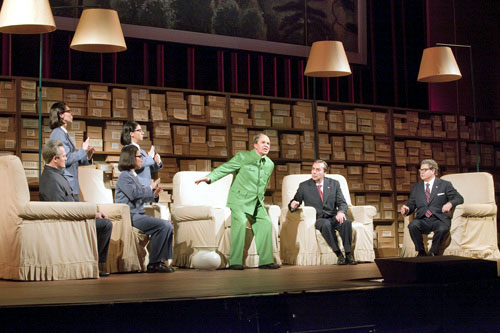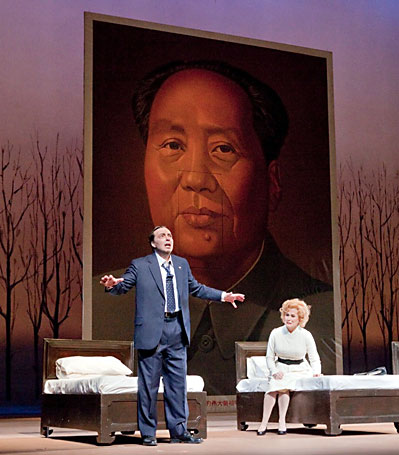|
"At the edge of the Rubicon, men don't go fishing." "Revolution is a boy's game." "The revolution does not last." "History is a dirty sow." Alice Goodman's poetic libretto for Nixon in China often startles the listener with its mix of profundities and blatant clichés that reach out to current day events like the revolutionary fever now going viral in the Middle East.
On February 12, 2011, while viewers in 1,500 movie theaters in more than 40 countries globally as part of "The Met: Live in HD" series partook of John Adams' first opera Nixon in China, this reviewer witnessed the engaging four-hour work inside the Metropolitan Opera house where the composer led the orchestra and baritone James Maddalena sang Nixon, a role he developed in the opera's 1987 Houston Grand Opera premiere. Although Nixon in China has been produced many times nationally and internationally (initially there were productions by the three co-commissioners: Houston Grand Opera, Brooklyn Academy of Music, and the Kennedy Center), this new production at the Metropolitan Opera is a company first, including the debut of John Adams as conductor.
The setting is Richard Nixon's presidential February 1972 visit to Mao Tse-tung (Zedong) in Peking (Beijing), China. This is the media event that broke open the Cold War to a new level of diplomatic exchange. Act I Scene 1 opens with President Nixon and his wife Pat arriving in Peking in the United States Air Force One plane Nixon named the "Spirit of '76." The audience is immediately tipped off about the historic importance of this trip when Maddalena as Nixon sings the aria "News." In Scene 2 Nixon meets Mao (tenor Robert Brubaker) in the Chairman's study. Scene 3 takes place at a banquet held in the Great Hall of the People.
Act I is fairly static and trance inducing as a number of talking heads present themselves. Various unexpected body movement (not exactly dance but certainly choreographed well by Mark Morris) enliven the singing that is set to minimalist repetitions. For example, during the singing of "News," cast members execute a modified grapevine movement that moves a reception line of Chinese officials toward Nixon for a handshake. In Mao's study, his secretaries circle their hands in what seems to suggest they are cogs and wheels in the big machine that is the new China. Certainly the Minimalist repetitions of John Adams' music seems to suggest a rolling energy and progressive movement toward some unseen horizon as if one were riding a huge river in spring fed by limitless volumes of melting snow.
 |
Act II belongs to the leaders' wives—Pat Nixon (Soprano Janis Kelly) and Chiang Ch'ing (coloratura soprano Kathleen Kim). Scene 1 presents an intimate portrait of Mrs. Nixon who says she doesn't day dream and that she treats each day like Christmas. Like all tourists to China, she is taken on a souvenir shopping trip during which she buys a mass-produced glass elephant that she takes delight in since it symbolizes her husband's political party.
Scene 2 introduces the Nixons to Madame Mao's agitprop ballet The Red Detachment of Women. The ballet features a ruthless master who in physical demeanor looks much like Henry Kissinger (bass-baritone Richard Paul Fink). The villainous master beats a young peasant woman ( dancer Haruno Yamazaki). This upsets Mrs. Nixon so much that she becomes part of the ballet as does Mme Mao who demonstrates how cruel she is and how her cruelty played out in China's Cultural Revolution, a social movement that ran from 1966 to 1976.
Act II is surreal contrast to Act I and leaves a viewer wondering why the creators of this opera make a buffoon of Kissinger who defends the ruthless man beating the girl versus the more sympathetic portrayal of Richard Nixon. Perhaps the hint comes with the line about Kissinger that is delivered by the opera's Nixon, "You'd hardly know to look at him that he's James Bond." Kissinger conducted a lot of talks during that time in secrecy. Mark Morris's choreography shines through the chaos that is Act II, Scene 2 and adds to the controversy about what the Cultural Revolution meant for the development of the People's Republic of China. Have the women in the Red Detachment overcome the male dominated culture that has always been China? Should one ignore the slogan that "history is a dirty sow?" (Why is the pig, the female animal in this case?) Did China really make women equal or are they, like Madam Mao, just under the thumbs of more powerful men?
Act III caps the diplomatic visit with introspection expressed in the private bedrooms by the principal characters. There is also a surreal aspect to this act as expressed by Peter Sellars' bold sets. For example, a large poster of Mao contains a door that goes through the Chairman's face. Mao himself comes through this door and descends the stairs to his private chamber with his wife. A little later, Kissinger asks where the toilet is and leaves his bed to exit and never return through the door in Mao's face. A pas de deux takes place behind the row of beds by the same liberated peasant girl from Act II and her lover (dancer Kanji Segawa).. The opera ends quietly with Chou En-lai—Zhou Enlai—(baritone Russell Braun) wondering if this interaction with the U. S. president has done anything good for all those involved.
 |
Overall, the singers met the high standards one would expect at the Metropolitan Opera. James Maddalena's rich baritone voice ably provided both the emphatic and the paranoid sides of Richard Nixon. One disappointment was that the orchestra covered his voice in Act I, Scene 1 so that his delivery of "News" not only offered less volume but also, worse, less power. Was that orchestral volume needed because of the high definition transmission to the movie houses or just a fault of the conductor? Neither it turns out. According to a friend of the reviewer who saw the transmission of the opera in a movie house in Virginia, James Maddalena was having serious vocal problems as the opera opened, but these problems quickly resolved after he sang the aria "News." Janis Kelly made Pat Nixon a wonderfully sympathetic character who has an endearing streak of naivety. In contrast, Kathleen Kim stood out as an evil Queen of the Night with her impressive performance of "I Am the Wife of Mao Zedong."
Thus John Adams in collaboration with Alice Goodman and director Peter Sellars shows us that edge, that point of no return—the Rubicon—where history has been crushed by a cultural revolution that both released the oppressed Chinese people (as the four big-character posters painted in red shown at the opening curtain expressed) but also subjugated the entire population of the Republic of China, who are like robots. And yet, the Chinese revolution opened the door to the Western World. Maybe in this opera, the creators are saying Nixon and Kissinger violate the warning that men don't go fishing at the edge of the Rubicon. After all what is a diplomatic trip like the one Nixon took to China except a fishing trip, an opportunity to see what will be pulled out of the water or thin air?
|

